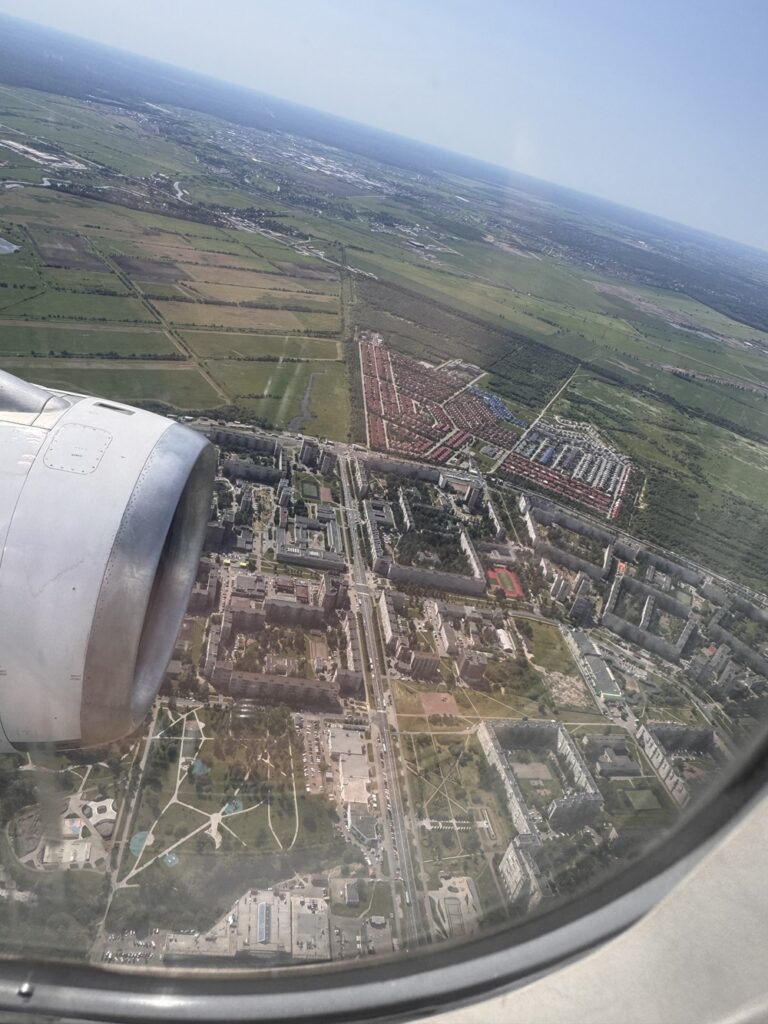


 Dimitri’s wife is grabbing her purse to go to the grocery store, when he casually says “it’s 5:45.” She just as ordinarily replies, “I’ve got cash.” Dimitri sees the slightly puzzled look on my face and flippantly notes, “they turn off the internet at six thirty now,” shrugs, and goes back to reading his paper.
Dimitri’s wife is grabbing her purse to go to the grocery store, when he casually says “it’s 5:45.” She just as ordinarily replies, “I’ve got cash.” Dimitri sees the slightly puzzled look on my face and flippantly notes, “they turn off the internet at six thirty now,” shrugs, and goes back to reading his paper.
Perhaps similar to London life during the blitz. Various municipal govts coordinated the shut down of lights and people wait. Others got about doing what they needed to do, sirens notwithstanding.
There is a familiar life amid modern drone warfare, and with the similar control of electricity comes the need to add internet.
When the drones are coming they turn off the internet.
As I contemplate the contrasts in social resilience, my most familiar reference point is life after a hurricane. In Florida when we are dealing with the aftermath of a hurricane, no power, no water, no internet, etc., you adapt to life without modern technological conveniences.
If you’ve ever lived amid the aftermath of natural disasters, you understand the need for a plan and quick adaptation. Do it a few times and adaption becomes ordinary. Horrible in ways, yes; awkward, certainly. But you take things in stride; overcome, figure out the optimal solution and keep moving. However, not everyone is prepared to consider a disruption an ‘inconvenience’ and many people who need consistency to retain stability end up in panic. I think long term readers well understand the reference.
As Dimitri goes back to the paper my mind shifts to stuff I’ve heard in bits and pieces but never given context before.
I think about this U.S. ‘Space Force’ thing, and now realize there are people who have gamed out modern warfare more than we discuss as a western technological society.
 My mind also thinks about those reports I read a few years ago about various western govt offices concerned about the ability of Russia to target U.S. satellites. Suddenly I realize cell phone and telecommunication is not their concern.
My mind also thinks about those reports I read a few years ago about various western govt offices concerned about the ability of Russia to target U.S. satellites. Suddenly I realize cell phone and telecommunication is not their concern.
There’s no internet; the problem is bigger than a temporary outage of Uber. I wonder how the commercial air traffic between Kazan, Moscow and St Petersburg is not disrupted. Old school stuff applies. Meanwhile, the kids, lots of them are playing outside as kids do – apparently life amid modern drone warfare is resilient. No one is staring at the sky.
It is very odd to see how quickly a non-technology driven society can adapt to no electricity and no internet as an ordinary part of daily life. An entire nation just figures out the optimal solution, in part because their time between analog and digital has been short. Russians have a totally different context of dependency.
I’m also starting to realize how the flexibility within a non-technological society is an asset in modern warfare. Turn off the internet in New York, Chicago, Los Angeles or any major metropolitan area – how would life be impacted?
I can only imagine the reactions from a generation who has never known life without wi-fi.
It would be a very good intellectual exercise to think carefully about what your life would be like without cell phone coverage or internet services. There are more than a few people who have never learned to read a clock with hands.
In Russia when the drones are coming they turn off the internet and sometimes the electricity. Stores stay open; people do the ordinary things people do, the trains still run, the busses stay on schedule and you can still get a hot coffee and a sandwich just about anywhere, albeit sans Starbucks. Private taxis, Uber equivalents, switch seamlessly to line up at pick-up points without issue. Try to duplicate that rapid on/off precision in Boston, Miami or St Louis… see my point?
Then extend those thoughts to Paris, Frankfurt, Warsaw or Helsinki. Dimitri is thinking about ordering a pizza, while I’m starting to realize why NATO countries are going bananas.
Can Russia beat Europe in modern warfare?
Well, turn off the electricity, turn off the internet and see what happens to social society in Prague, Rome or any region in Europe when the sirens start. Yeah, NATO is going bananas as Putin’s best non-discussed weapon just looms quietly.
Putin’s strongest weapon is essentially a social infrastructure akin to a nation full of people who can live in the aftermath of a hurricane without needing a digital screen to provide directions to the next six hours of their life.
Again, somewhere, in some office complex deep in the bowels of some agency or bureaucracy, someone has ran models of this and yet I cannot find a reference anywhere to ordinary people talking about it.
In the glovebox of every taxi in Russia you will find a paper map; when was the last time you saw one in the USA?
When the drones come, they always turn off the internet and sometimes the electricity.
How would we deal with that…
Think about it.
